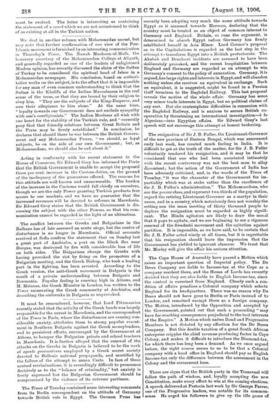The Cape House of Assembly have passed a Motion which
raises an important question of Imperial policy. The De Beers Company are liable to Income-tax at the Cape as a company resident there, and the House of Lords has recently decided that they are also liable to English Income-tax, since the control is exercised from England. Clearly such a con- dition of affairs penalises a Colonial company which selects England for its headquarters. There was no reason why De Beers should not have gone to Berlin or Paris instead of to London, and remained exempt there as a foreign company. The Motion, introduced by the Opposition and accepted by the Government, pointed out that such a proceeding " may have far-reaching consequences prejudicial to the best interests of the Empire." A Motion which unites Bond and Progressive Members is not dictated by any affection for the De Beers Company. But this double taxation of a great South African enterprise cripples the chief revenue-producing factor in Cape Colony, and makes it difficult to introduce the Diamond-tax, for which there has long been a demand. As we once argued before, the right course seems to us to be that a Colonial company with a bead office in England should pay as English Income-tax only the difference between the assessment in the Colony and the assessment here.


































 Previous page
Previous page